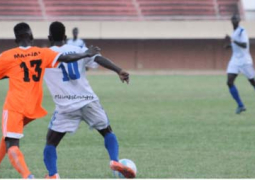
Issued Tuesday 28 March 2017
Micke
Svedemar, responsible for external relations at the School of Arts and
Communication, Malmo University in Sweden, has said they want to establish a
partnership with media houses in The Gambia to bring students from the two
countries together through internship.
He
spoke yesterday at The Point offices, following a meeting with the paper’s
management.
Mr
Svedemar, who is responsible for internship at his institute, said one part of
the partnership will be to try to create a platform for students to come to The
Gambia for internship in one or two organisations in the country.
Talking about the media, he said a free press
is very important and his students would learn from their Gambian counterparts
what it is like going from a dictatorship to a free country, and how that
affects the people, the press, and those connected to government in The Gambia.
He
said lack of a free press in a country can have serious effects on the ability
of people and journalists to do great things, as well as damage the image of a
country.
He
pointed out that a journalist must have a critical view, and it is important to
have journalists who are critical of government and issues of governance,
because “power is a very dangerous tool and can corrupt”.
Nils
G. Indahl, a journalism trainer, who is also an Adjunct Professor at the
University of Copenhagen, said 14 years ago they visited The Gambia to start
some projects in computer science and journalism, but because of the political
condition then they decided to postpone those projects.
He
said with the new government in The Gambia, they would come back to the country
to deal with the media and assess the needs of the industry.
As
a political scientist, he has foreseen that the next 2 to 3 years will be very
important for the future of The Gambia; hence he would like to contribute to
that development in some way.
He
said as a journalism trainer he helps journalists migrate from print journalism
to digital journalism.
Mr
Indahl, who has trained a good number of African students in Germany, said he
intends to put up a team of people that can assist Gambian journalists to
migrate from print journalism to digital journalism.
“If you want to have a free society, you need
to have free citizens that can access free information,” he said, adding that
the media has a major role to play in the future of the new Gambia.
The
Point newspaper’s co-publisher, Pap Saine, expressed delight about the visit,
saying in his earlier discussion with the visiting educators he had briefed them
that since President Barrow took over the reins of power, things had improved
“tremendously in terms of press freedom” in The Gambia.
He
hopes to have a very good collaboration with the Swedish visiting educators in
terms of training, as well as in maintaining the bilateral relationship between
The Point and the university and Swedish educators.
He
described their meeting as fruitful and would like to work with them to ensure
it yields dividends, especially on getting Swedish journalists to visit The Gambia
for internship at The Point, and The Point and other Gambian journalists to do
the same in Sweden.
“This
will help Gambian journalists to greatly improve themselves and journalism in
the country,” Mr Saine said.


